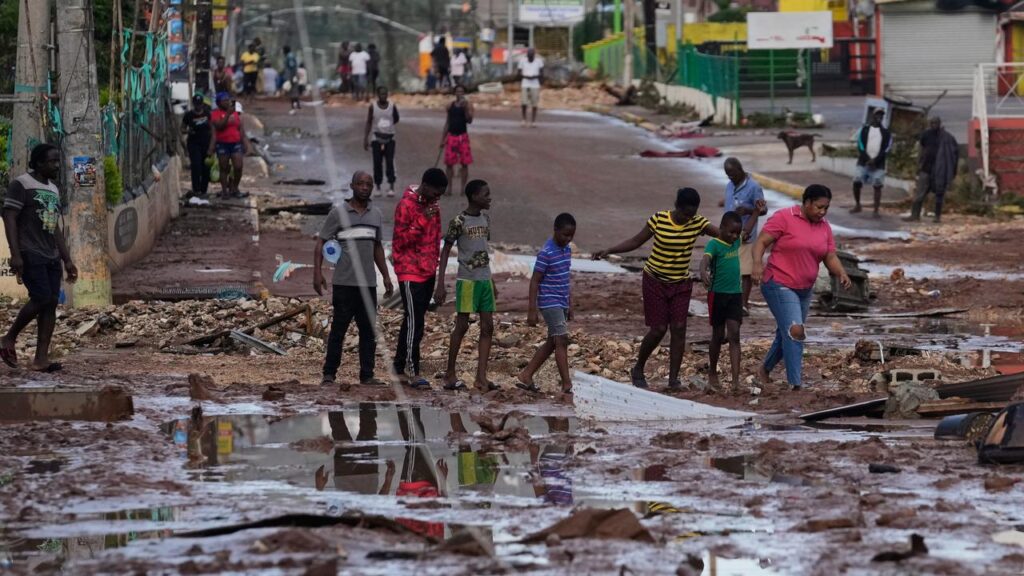Dozens dead after Hurricane Melissa batters Caribbean
Dave Sherwood, Zahra Burton and Sarah Morland |

Hurricane Melissa has barrelled through the Caribbean after thrashing Cuba’s second-biggest city, isolating hundreds of rural communities, unleashing devastation in Jamaica and drenching Haiti, where at least 25 people were killed.
Melissa struck Jamaica on Tuesday as the strongest-ever hurricane to directly hit its shores, with sustained winds of 298km/h, well above the minimum strength for a category five, the strongest classification for hurricanes.
On Wednesday night in the Caribbean, Melissa was a category one hurricane moving northeast through the Bahamas archipelago, which completed the air evacuation of nearly 1500 people early.

The storm did not directly hit Haiti, the Caribbean’s most populous nation, but it hurled days of rain over the island nation. Authorities reported at least 25 deaths, largely due to floods in Petit-Goave, a coastal town 64km west of the capital where a river burst its banks.
At least 10 children were killed and 12 people remain missing there, Haiti’s disaster management agency said.
In Haiti, where a gang conflict has displaced more than 1.3 million people, authorities said more than 1000 homes were flooded. People living in makeshift camps said the flooding made it impossible to sit or sleep, and said the government and aid groups were slow to bring supplies.
Fortune Vital, a displaced man in Les Cayes, said he was separated from his family which already lacked sufficient food. “If the hurricane comes on top of all the problems we already have, we’ll simply die,” he said.
On Tuesday, Melissa made landfall in southwestern Jamaica, devastating areas already battered by last year’s Hurricane Beryl. US forecaster AccuWeather estimated Melissa cost $US22 billion in damages and economic loss in Jamaica alone, and that rebuilding could take a decade or more.

Local authorities said flood waters had washed up four bodies in the southwestern agricultural hub of St. Elizabeth. About 77 per cent of Jamaica was without electricity, authorities said on Wednesday morning. The capital Kingston was spared the worst damage and its main airport was set to reopen on Thursday.
Prime Minister Andrew Holness visited Black River Hospital, the only public hospital in St. Elizabeth, where aerial footage showed the wrecks of buildings, roofs blown off, power cables knocked down and fields strewn with rubble.
Hospital workers there said the building showed some significant damage, and staff told the prime minister they spent the night fearing for their own families while working by flashlight to care for patients.
“It was the most terrifying experience in all my life,” a hospital worker said. “It is beyond imagining. At one point it was as if missiles were blowing through the glass.”
Melissa was a still major category-three when it hit Cuba overnight with winds of 190km/h, landing in Guama, a rural, mountainous area some 40km west of Santiago de Cuba, the island’s second-most populous city.

At least 241 communities remained isolated and without communications on Wednesday following the storm’s passage across Santiago province, according to preliminary media reports, affecting as many as 140,000 residents.
Across eastern Cuba, authorities evacuated around 735,000 people as the storm approached. Most remained in emergency centres.
No deaths were reported on Wednesday but President Miguel Diaz-Canel said the island had suffered extensive damage and warned of vigilance as rains continue to lash the region.
Meteorologists at AccuWeather said Melissa ranked as the third-most intense hurricane observed in the Caribbean, after Wilma in 2005 and Gilbert in 1988 – the last major storm to directly hit Jamaica.
But scientists say hurricanes are intensifying faster with greater frequency as a result of warming ocean waters caused by greenhouse gas emissions. Many Caribbean leaders have called on wealthy, heavy-polluting nations to provide reparations in the form of aid or debt relief to tropical island countries.
Reuters